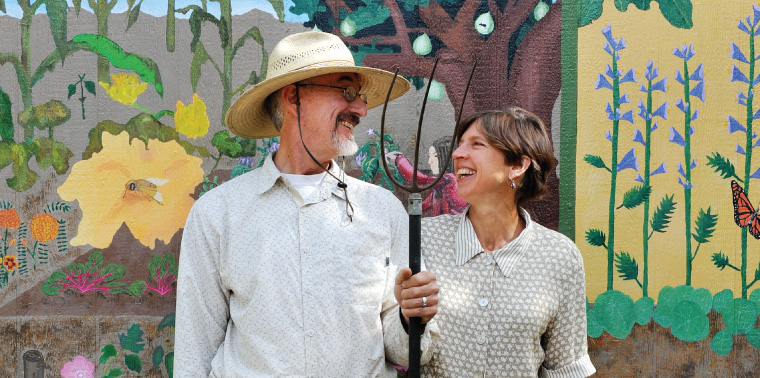August 26, 2013 — The debate around genetically engineered crops and organic farming usually begins well beyond a point of no return. Heels dug in, opposing sides accuse one another of being anti-environment or anti-science, evil or ignorant. From there, what takes place is something closer to a schoolyard shouting match than adult discourse.
This is not usually a good — or very successful — place to start honest discussions looking to move conversations forward.
And it’s not the starting point for Pamela Ronald, a University of California, Davis, plant geneticist, and Raoul Adamchak, a farmer who runs the student organic farm on campus. The two are co-authors of Tomorrow’s Table: Organic Farming, Genetics, and the Future of Food. They are also married — a truly odd couple in a world divided by preconceived notions and decisions before discussions.
Debates pitting genetic engineering against organic agriculture, focus on, among other things, what each camp feels is necessary to feed a growing population. Both claim to have science on their side when it comes to producing the amount of food needed in a way that will do the least harm to the environment. But, where others see opposition, Ronald and Adamchak contend the two practices should be used in tandem toward the goal of sustainable agriculture.
“The common ground was obvious to us. It isn’t very difficult if you look at the overall goal of sustainable agriculture … and say, ‘What’s the best way to get there?’” —Raoul Adamchak
“We both came into our respective fields because we’re interested in ecologically based farming,” says Ronald, who has successfully genetically engineered rice to tolerate prolonged periods of flooding, a problem in many parts of the world where rice is a dietary staple. “We believe that it’s really a distraction to think about how the seed was developed. … The issue is really whether a particular seed or farming practice can advance the goals of sustainable agriculture.”
“The common ground was obvious to us,” Adamchak says. “It isn’t very difficult if you look at the overall goal of sustainable agriculture … and say, ‘What’s the best way to get there?’ It was relatively easy for us to say, ‘We should use the best technology and the best farming practices possible.’ That seems to us a perfectly reasonable way of achieving the most sustainable agriculture possible.”
Ronald and Adamchak met through mutual friends; both had already been active in their fields for many years. Ronald had worked on organic farms when she was younger, and Adamchak had studied entomology and agricultural development in graduate school — overlapping experiences that Ronald says allowed them to connect. In Tomorrow’s Table, the two argue that any technology or farming practice is appropriate as long as it produces abundant, safe and nutritious food; reduces harmful environmental inputs; provides healthful conditions for farm workers; protects the genetic make-up of native species; enhances crop genetic diversity; fosters soil fertility; improves the lives of the poor and malnourished; and maintains the economic viability of farmers and rural communities.
“You can’t generalize about genetic engineering, whether it’s good or bad. It’s really the issue of the trait, the environment, the crop, the farmer.” —Pamela Ronald
Trouble begins, Adamchak says, when people abuse any one tool at the disposal of growers. “If you use an herbicide-tolerant plant and you spray Roundup year after year after year, it’s not going to end well. You are going to get weeds resistant to Roundup.” Instead, he says, such a genetically engineered plant is just one tool that can be used, but it “needs to be part of an overall, integrated weed management system.” However, current guidelines defining organic farming do not allow organic farmers to use genetically engineered plants in their systems, so Adamchak is not able to use them on the UC Davis farm.
The discussion around genetically engineered crops has been hurt by oversimplification and generalization, according to Ronald. “People hear ‘GMO’ and they think, ‘I don’t want anything genetically modified,’ but of course everything we eat is genetically altered in some way through crop domestication,” she says. “You can’t generalize about genetic engineering, whether it’s good or bad. It’s really the issue of the trait, the environment, the crop, the farmer.”
Adamchak says the couples’ differing expertise allows them to fill gaps in one another’s knowledge. “We can give each other a reality check,” he says. “If she starts talking about farming or [says] something that doesn’t jibe with how I think farming happens, I can say, ‘But, Pam, growers don’t do that.’ And if I’m talking about genetically engineered crops and I don’t understand something or I misquote something, she can say, ‘That’s not done this way; it’s done this way.’”
So, what would the future of food look like in a world in which genetic engineering and organic farming are both seen as legitimate tools for achieving sustainable agriculture?
“I think we’d have an all-of-the-above strategy,” Ronald says. “You would develop [crop] varieties based on sustainable agriculture criteria rather than marketing criteria or an agenda pushed by somebody who has a conflict of interest.” Adamchak, for his part, sees good in extending the core value of sustainable agriculture beyond organic agriculture, which makes up only about 1 or 2 percent of the cropland worldwide. “[We] need to get the vast majority of conventional farmers focused on the goals of sustainability,” he says. “The ideal vision is for more ecologically based farming practices, [with] tools like genetic engineering to be used to impact those issues of sustainable agriculture, like soil erosion, pesticide use and fertilizer runoff.” ![]()
Ensia shares solutions-focused stories free of charge through our online magazine and partner media. That means audiences around the world have ready access to stories that can — and do — help them shape a better future. If you value our work, please show your support today.
Yes, I'll support Ensia!


Yes we 'modify' all the time, and have done for thousands of years - not only plants but also animals. However there are two characteristics of modern 'GMO Monsanto-style' that I find disturbing. One is the modification to withstand certain toxic commercial products, eg Round-Up. The other is the introduction of genes from very different species, eg mouse genes in tomatoes. In my opinion these are totally different processes - and indeed should rightly be named differently.
These are the processes that we (at least I) would like to see named and labelled. Or forbidden.
Check out Masanobu Fukuoka, Bill Mollison, David Holmgren & Geoff Lawton(his youtube videos on Greening the Desert & Designing a Food Forest are great) just as a starting point.
I am in connection with thousands of people worldwide who are practicing this, both in cities, towns and rural areas.
I like many others am being the change I wish to see rather than pointing fingers around to find blames, excuses & reasons.
In no way a 'genetic engineer' be termed as 'geneticist'.
I also have reservations about golden rice. It's not that I think its consumption may be harmful, but just that I doubt it is truly needed. I reason that Vitamin A deficiency cannot have been a long term problem in those places where it is now, or else those societies would not have survived. So what has changed in their eating habits to make it a problem now? Could it be cultural attitudes that favor refined rice over brown rice? Could it be that people are not eating vegetables, many of which are high in Vitamin A, the way they used to? Wouldn't it be simpler to promote vegetable gardening? But I don't live in those parts of the world, so who am I to say? I do know that the developers of golden rice made it available for free, so I believe their intentions were good.
And there have been other applications of genetic engineering for which there probably were no other good alternatives. For example, saving papayas from a disease that threatened to wipe out all papayas.
I also share your final concern, about the control of crop genetics by the multinational companies that increasingly control both the chemicals and the seeds that were designed to go with them. Too much power concentrated in too few hands is never a good thing.
But I think it is a mistake to reject the technology just because of who promotes it. As Jonathan Foley wrote in an Ensia editorial a year or so back, GMOs have failed to deliver what they promised in terms of soil conservation and reduction in pesticide use. But that doesn't mean that they have not been useful. There are no panaceas.
Lois, to say that GMOs may have been 'useful' sounds to me like saying that the space program was useful because it gave rise to teflon-coated kitchenware. Yes, sure. But compared with the potential usefulness of other investments? And discounting the side effects not yet discovered (there are bound to be more, even statistically)?
My fundamental point is that genetic engineering is a tool, one tool of many. It is not the tool itself that is the problem, but some of its applications. The gravity of the problems that the world faces now, namely, how do we feed, clothe, house and warm 7 billion plus humans in the face of climate change, soil loss, water pollution, crop diseases desertification, etc, are too great for us to reject a tool that is potentially as useful as GMOs just because it may be risky.
I am not saying that GMOs are a panacea. There are no panaceas, which is why we need to have many tools in our tool chest.
Although we must be cautious, and reject supposed solutions for which the proven risk is too great, I am not convinced that is the case for all applications of GMOs, though it might be the case for Bt crops. I have enough confidence in our ability to discover the real risks--and in our system of scientific review to reject phony science--to trust that the risks of GMOs are low. (By contrast, we have now have definitive enough evidence that neonicitinoid pesticides harm pollinators, that I believe we ought to ban them.)
I used to share your skepticism of the space program. The development of teflon in my opinion does not rise to the level of usefulness to justify the enormous cost of the space program, either financially or environmentally. I cringe when I hear of space tourism for it seems to me that the carbon released into the atmosphere by even a single blast off is extravagent.
But would we have developed satellites without the space program? Modern communications would not be possible without satellites, much less modern weather forecasting, which has saved innumerable lives. Satellites are now being used to monitor and manage a whole host of environmental problems. Yes, it could be said that modern communications have eroded community because people have forgotten how to talk face to face, or that before weather forecasting people were better at reading the sky for signs of a storm. This may be true-- though I'm not sure, given the way that cell phone technology is revolutionizing health care in Africa.
My point is that we cannot put the genie back in the box, either on the space program or GMOs, especially not with 7 billion people on the planet. (We really need to stop adding more people.) All we can do is move forward--cautiously, knowing the risks better than our predecessors thanks to the information age. We can only pray for wisdom.
The whole feeding of 7 billion people line is one of the best public relations line in history. I can't believe that so many have fallen for it. Of course I dont want to see anyone starve, but there are easier and safer solutions to the problem. One of them is to eliminate growing crops that do not produce nutritious foods. The other is to decentralize our food systems. The third is to push for more equal distribution of wealth and power by diluting the clout of large multi national companies. Another is to promote, not reduce genetic diversity. I wonder why we as humans do not learn from our past. A crop that is genetically identical falls prey to a problem at a 100% rate. A genetically diverse crop will have some individual plants that survive. Do we remember the Irish potatoe famine at all?
Please read "Wake up before it is too late"
There's nothing in your latest comment with which I disagree. It's nice to find common ground. I especially agree with your statement that one of the problems with GMOs is that they have made it possible to grow vast monocultures of corn and soybeans. Although I do not think that GMO technology itself is a problem, I certainly do agree that over-reliance on just a few crops is a huge problem.
BTW. If you Google my name you'll find out that I work on the development of one of several possible new crops that might diversify the agricultural landscape of the Upper Midwest.
A good part of the problem here is the less than perfect reasoning used, most especially in the confusion of ends and means.
Pamela & Raoul have the best of intentions: more & better food for an apparently never-ceasing human population. But HOW we achieve these goals is another matter. As I come from a conservative approach, I know full well that good intentions too often pave the way to Hell. We have seen this over and over in human history, so we don't really need to verify it by yet one more study.
The fact is that there have not been enough large-scale studies OVER TIME on GMOs, so we have only short-term studies on lab rats for the most part, NOT human subjects.
There was a larger scale study over more than 12 months by an Italian medical scientist in which he found multiple reproductive defects in his rats, and we must pay attention to these, unless of course we are not parents, so we're only concerned for our cancers, tumours, etc.
When I was a pre-teen I read some of Dr George Gamow, the UK-based astrophysicist's writing, and it was there that I learned to start thinking in 100,000 year blocks, else get my findings skewed by human bias. I suggest we need to take much longer range studies for our standards, certainly not less than three generations of lab animals [No, I'm not a vivisectionist!].
Even then, we need to be cautious about letting the GMO genie out of the lamp, as once released I doubt that either Monsanto or Pandora will be able to capture it, as then we are done, and deservedly so.
After all, it is likely that a disregarded Nature's payback will be far more than we mere humans can deal with in the short-term.
Lois, I absolutely do not share your faith in the reliability of the peer review process. Without calling into question the ethics of reviewers, there are multitudinous examples over the past 100 years that it works only up to a certain point.
When we are talking about science that could threaten the future of humankind as a whole (as well as possibly contributing to its survival) we are looking at an extraordinary situation that calls for extraordinary caution, care, and transparency.
Surveying recent literature on actual food production innovations (non GMO) I find convincing arguments for redirecting investments from tweaking current systems (I include GMO in that category) to systematic rethinking and reintegration of different aspects of food production; first and foremost to investments that will secure a healthy future for the world's soils. It's no coincidence that this is the UN Year of the Soil.
I too am heartened by new developments in plant breeding, such as use of molecular markers and gene editing, that may make gene transfer (GMO's) seem like a crude and un-needed technology.
I work in Agronomy at the U of Minnesota, and think that most of my colleagues share a holistic perspective of agriculture and appreciate the need to design agricultural systems modeled after natural ecosystems. It may not have been that way a generation ago. It just seems that the public still hasn't gotten the message that the university is more enlightened than it used to be. The existence of ENSIA is evidence that we have changed.
I need to ask you about a different aspect, though. It's about what the commercial industry is doing with this science.
There's talk of current concerns, in many lay people's conversations, that some seed industries can influence corn crops that will not reproduce, which can affect surrounding fields, disabling farmers from using seed from their crops, forcing farmers to buy from these companies. Also, that instead of using the technology to improve plant resistance to pests, but make the plant crops more tolerant to pesticides applied to them.
How can what you're doing be promoted, delineations be made, while limiting commercial exploitation of this science?
Please tell me there is some sort of regulations and monitoring methods being developed and put into place. And if so, how can I/we support such governing action (to be established or managed and regulated in a way that "makes sense", is actually useful.)
Please respond, even if I am lagging behind on the latest info. Thanks so much.